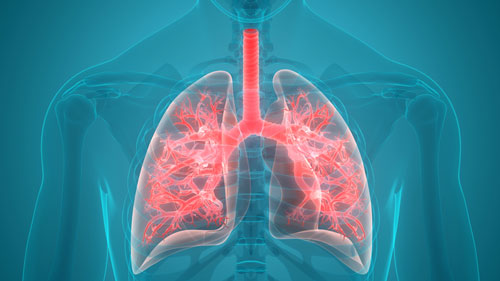The condition of your lungs has never been more important.
The coronavirus attacks the respiratory system. That means the strength of your lungs may determine if you live or if you die if you get COVID-19.
When people are infected, the virus travels to the mucus membranes before spreading to the lungs. To control the infection, the body responds with inflammation in the lungs.
This inflammation prevents the lungs from oxygenating the blood and removing carbon dioxide. Breathing becomes difficult. Eventually, the lungs may fail altogether. This is when patients must be put on a ventilator. Many of them don’t make it.
But there are things you can do to improve your respiratory health to prevent this dire scenario.
5 Steps to Healthier Lungs
Here are natural methods to boost your breathing strength.
- Eat fiber. Eating fiber improves lung function, according to research published in the Annals of the American Thoracic Society.[1]
Scientists studied lung function in 1,921 adults. Those who ate at least 17.5 grams of fiber a day had stronger lungs. They had a reduced risk of developing a lung disease such as chronic obstructive pulmonary disease (COPD).
But not all fiber works, according to the study. Fiber from fruit and vegetables, but not from grains, was associated with better lung function.
Good sources of fiber include spinach, green peas, acorn squash, guava, avocado, raspberries, dried figs, Brussels sprouts, and persimmons. - Use an inspiratory muscle trainer (IMT). This is a device used to wean people off ventilators. But they can build lung strength in anybody. The device makes it more difficult to inhale and exhale, strengthening the muscles you use to breathe.[2]IMTs are widely available online. You can find models ranging in price from about $30 to $80.They’re easy to use. You breathe through the device for 30 breaths, twice daily. It challenges your lungs to work harder. You can usually adjust the difficulty level.
- Eat these fruits. Anthocyanins are beneficial plant pigments that give fruits and vegetables a deep red, purple, or blue color. They are in berries and purple-colored vegetables.
Research at the Johns Hopkins Bloomberg School of Public Health looked at how anthocyanin consumption affected lung function in 436 people. The subjects took a lung function test. And researchers monitored their anthocyanin intake. Ten years later, their lung function was tested again.[3]
There was a strong relationship between anthocyanin consumption and lung health. The more deeply pigmented produce subjects ate, the better their lung health.
“Foods rich in anthocyanin flavonoids might protect the lungs through their antioxidant and anti-inflammatory properties,” Dr. Vanessa Garcia-Larsen said. She led the study.
Foods richest in anthocyanins include: blackberries, blueberries, currants, red cabbage, purple sweet potatoes, purple cauliflower, acai berries, eggplant, and black plums.
Increase your levels of the vital compound by blending a handful of dark berries into a fruit smoothie or yogurt. Add red cabbage to salads. You can also get anthocyanins in supplement form. Look for blueberry, tart cherry and other dark berry extracts online and in health food stores. - Exercise. Physical activity strengthens lungs by improving breathing capacity.
Dr. Ryan Steele is an allergist-immunologist and assistant professor at the Yale School of Medicine. He said that when people are sedentary, their lung sacs collapse slightly. When you exercise, you breathe against resistance, “so the air has to work harder to get out,” said Dr. Steele.
When you do that, you’re expanding and keeping your air sacs open. This improves your lung function and makes you less likely to “hit a critically low lung function state, which would in turn cause you to not be able to oxygenate your blood,” said Dr. Robert Eitches, an allergist and immunologist.
Recommended exercises include jogging, yoga, and pursed lip breathing. That’s when you breathe in deeply through your mouth, then exhale through closed lips, as if you’re blowing up a balloon.
“These exercises will teach you how to fight off the respiratory side effects [of Covid-19] on your own,” said Dr. Eitches.[4] - Take omega-3 fish oil supplements. Perhaps the most dangerous effect of COVID-19 is excessive lung inflammation. Omega-3 fatty acids have strong anti-inflammatory properties.[5]
But make sure to get the right kind.
Most fish oils are made with a cheap, fast manufacturing process that yields something called an ethyl ester (EE). This kind of fish oil is less bioavailable. Labels of EE fish oil often say the product is derived from “marine oil concentrate.”[6]
Instead, look for brands that contain the triglyceride form of fish oil. It should be noted on the label.
A high-quality fish oil will also be relatively free of any fishy tastes or smells. The oil should be relatively translucent and free of cloudiness.
You’re more likely to find quality fish oil supplements at health food stores and online than at drug stores and supermarkets.
According to the European Food Safety Authority, omega-3 supplements can be safely consumed at doses up to 5,000 mg daily.[7]
But if you’re on a blood-thinning medication, check with your doctor before taking fish oil.
Keeping your lungs healthy not only increases your chances to beat COVID-19, it improves your overall health and fitness.
Editor’s Note: Discover the single best supplement for stronger immunity… The fruit extract that helps 93% of people with respiratory viruses get better in just two days… The germ hotspot that most of us forget to sanitize. Find all this and more in Independent Healing’s Coronavirus Pandemic Guide. Go HERE.
Related Articles
Coronavirus: Stay in the ‘Goldilocks Zone’ for Better Health
Coronavirus Stress: 5 Ways to Keep Calm and Carry On
9 Coronavirus Symptoms You Should Watch For
Like this Article? Forward this article here or Share on Facebook.
[1]https://www.sciencedaily.com/releases/2016/01/160122145457.htm
[2]https://www.ncbi.nlm.nih.gov/pmc/articles/PMC2465184
[3]https://consumer.healthday.com/respiratory-and-allergy-information-2/misc-respiratory-problem-news-580/berries-and-grapes-may-keep-you-breathin-easy-734092.html
[4]https://www.cnn.com/2020/05/06/health/how-to-improve-respiratory-health-coronavirus-wellness/index.html
[5]https://www.sciencedaily.com/releases/2017/08/170823093831.htm
[6]https://www.mygenefood.com/find-best-omega-3-fish-oil-supplements
[7]https://www.healthline.com/nutrition/fish-oil-dosage

